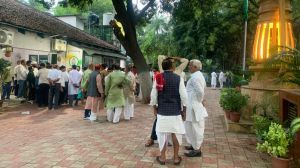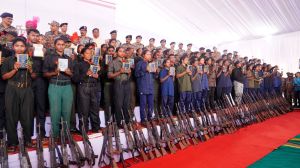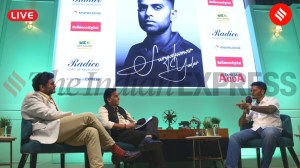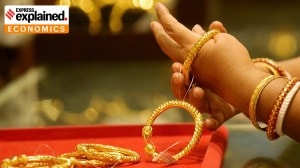Return of the bush shirt
From a historic election turnaround and the potential calamity of Sonia Gandhi as prime minister, has risen a wave of hope. National misery ...

From a historic election turnaround and the potential calamity of Sonia Gandhi as prime minister, has risen a wave of hope. National misery swirled for those few days. But out of the confusion has stepped the gentle sardar bringing relief and renewal. The spirit of the passionate Jawaharlal, which might have wept at the Congress’s degraded sycophancy and cringed at the ghastly ‘‘saint’’ cult of his granddaughter-in-law, will be soothed by Dr Manmohan Singh.
Dr Singh has travelled far beyond Nehruvian economics, but he embodies an important Nehruvian ideal: the bookish, austere, highly educated, middle class servant of the Indian people. People who once used Forhans toothpaste, drove Premier Padminis, wore bush shirts, listened to Vilayat Khan and Mozart on scratchy “record players” and beavered away in universities or government establishments. When the great Nehruvian institutions were built in the ’50s and ’60s, Nehru dreamed that this class would plunge into the service of India. But Nehru’s children betrayed him. They became distant and cynical about their country and sent their children away to affluent but soul-less suburbs in the US, urging them never to return. With the ascent of Dr Manmohan Singh, the educated middle class returns to national relevance.
The educated middle class, it has been argued, was the biggest loser of parliamentary democracy. With the entry of caste and provincial armies represented by massively popular movements like the BSP and SP, there was no longer any space for lawyers, engineers, technocrats. Yet the new Lok Sabha belies that wisdom. In the ranks of the new MPs, there may be Mulayam, Mayawati, Shibu Soren and Suraj Bhan but there is also Mani Shankar Aiyar, P. Chidambaram and Kapil Sibal, among others. The DMK MPs all hold one or more graduate degrees. Suresh Prabhu, the most acceptable face of the Shiv Sena, is a former banker and K. Chandrasekhar Rao, leader of the Telengana Rashtriya Samiti holds, a post graduate degree in Telugu from Osmania University. Thus if ‘‘middle class’’ is broadly defined as educated and urban, then this election has not only brought a sizeable number of middle class MPs but also reflected their voice and vote. Because most importantly, this election has anointed a middle class hero as prime minister.
Dr Manmohan Singh derives his moral legitimacy, his right to rule and his inordinate popularity squarely from the whole-hearted adoration of the middle class. As Congress candidate from South Delhi he was once dismissed as someone who could only be elected to a Rotary Club. But if he pulls off a successful prime ministerial tenure, he could be the greatest middle class hero after Nehru. There are three crucial touchstones of middle class approval: economic reforms, law and order and a tough line on corruption. If Dr Manmohan Singh aggressively defends these three, he could prepare the ground for a new generation of educated leaders to rise to prime ministerial office and banish forever the awful possibility of an uneducated purely populist prime minister in the future. In fact Singh’s prime ministership ushers in a trend that is already in evidence across the world.
Across the world as electorates grow more educated and aspirant they are electing knowledge-intensive leaderships, urgently needed to handle the increasingly complex business of delivering modern governance in sectors like telecommunications and international trade. The Argentine president is a former lawyer and economist. In the Czech republic, the prime minister is a historian. In Taiwan, the prime minister was a student of international commerce and in South Korea, the president is a human rights lawyer and the prime minister is a technocrat civil servant.
In India 1947 was almost entirely a bourgeois revolution until Gandhi put the Congress on a train to Champaran. Left leaders are almost without exception drawn from the middle classes. The Nehruvians were all uniformly educated folk who, notwithstanding their Oxbridge degrees and social background, were crucially committed to widening the ambit of the meaning of the word ‘‘democrat’’. It was the
Columbia and LSE educated Ambedkar who wrote the blueprint of modern India, and it was the Cambridge-educated Nehru who cleared the way for him to do so.
But instead of participating in the republican constitution, the middle classes abandoned India, seeking education and jobs overseas. The resultant vacuum was almost inevitably filled in by leaders like Mayawati and Mulayam, themselves beneficiaries of adult franchise and educational quotas. Their rise represents a significant forward movement in Indian democracy, yet it left the middle classes bitter and isolated.
Now Dr Manmohan Singh stands poised to spur middle class public participation. More educated people could join politics, more middle class groups could engage in collective civic action. The dominant trend of ‘‘who-cares-let’s-go-to-Texas’’ could end; instead more of the best and brightest could be motivated to work in their own country.
Yet so many middle class heroes have failed to rise to the Nehruvian ideal. Rajiv Gandhi promised to root out ‘‘power brokers’’ but became a victim of corruption charges. V.P. Singh blazed briefly as a crusader against corruption but became a partisan of sectional interests. T.N. Seshan was a loud rebel but later revealed as an autocratic maverick. Manmohan Singh too could fail. He could let noisy comrades of the Left pressure him into a ‘60s style budget of ‘‘taxing the rich to pay the poor’’. He could let dynasty overtake the Congress again if the presence of Rahul Gandhi begins to loom too large. Or he could fail to take action against his ‘‘tainted’’ ministers and become a lameduck PM floundering in the corruption of his colleagues. Fifteen years ago when he initiated economic reforms, Dr Singh, the Nehruvian, realised that the socialist state had become a predator. By slashing at the tentacles of that parasitic state, he paradoxically kept Nehruvianism alive because he acted out of his duty to the poorest Indian. Once again, Manmohan Singh must ride to the rescue of Jawaharlal’s India. His presence is a salve to a nation wounded by vicious hindutva and a shrill debate over foreign origins. The PM must demonstrate that the Indian middle class is at its noblest when its spine is unbending, when it is cosmopolitan, progressive and seeks to distribute wealth to the poorest woman in the land. Nehru’s middle class idealists have returned to power. Now they must make up for their years of aloofness and alienation.






- 01
- 02
- 03
- 04
- 05

























